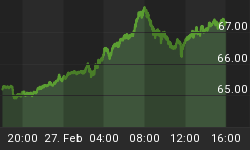The U.S. Dollar is down substantially across the board as an International Monetary Fund Report encouraged traders to lighten up their recent long positions. Since late last week the U.S. Dollar has been gaining ground versus most major currencies as investors remained skeptical that the global economy was on track for a recovery. Traders have been questioning whether the recovery would be able to sustain itself without the influence of central bank stimulus.
Yesterday's weaker than expected U.S. consumer confidence report demonstrated that consumers are still the key to a recovery as this poor number ignited a rally in the Dollar and a break in U.S. equities. Overnight, the IMF's Global Stability Report reassured investors that the global economy would grow faster than expected and erased some of the doubt left in the market following yesterday's weak U.S. consumer confidence report.
The IMF report reduced estimated losses from the financial crisis by $600 billion to $3.4. In reporting this substantial reduction in its estimate, the IMF said, "systemic risks have been substantially reduced following unprecedented policy actions and nascent signs of improvements in the real economy." The report went on to state that "there is growing confidence that the global economy has turned the corner, underpinning the improvements in financial markets."
Demand for the Dollar weakened on the news as traders felt more confident to seek higher yields in more risky assets.
The December Euro is rebounding after sustaining losses earlier in the week. It was reported early this morning that German unemployment dropped to 8% in September from a reported 8.3% in August. The move in the Euro is expected to retrace 50% of the recent decline from the top.
The December British Pound is continuing the rally from yesterday which was triggered by a favorable U.K. Retail Sales and second quarter GDP Report. The bullish IMF report is helping to extend the gains, which are still largely short-covering due to the recent sharp sell-off in the Pound.
The December Japanese Yen is trading higher today despite a report yesterday from the Japanese Finance Minister saying that Japan would not hesitate to intervene against the Yen if a rapid rise in price was triggered by abnormal trading conditions. This comment clarified last week's statement which indicated the Bank of Japan would allow the Yen to rally without interference.
Stronger demand for higher risk assets is expected to support the December Canadian Dollar. Overnight the Canadian Dollar is trading sharply higher on expectations of a rise in energy and equity prices today.
U.S. equity markets are trading higher on increased demand for higher risk assets. Yesterday, equity markets sold off hard following the release of a weaker than expected U.S. consumer confidence report. This report helped to increase investor fear that the global economic recovery would not be as strong as previously estimated.
U.S. Treasury markets are trading slightly lower. Traders are lightening up on long positions on the thought that a faster than expected economic recovery would encourage the Fed to raise interest rates sooner than previously expected. The firm equity markets are also encouraging traders to limit positions in fixed income instruments to take advantage of the higher yields offered by higher risk assets.
The weaker Dollar is helping to send December Gold sharply higher. This move was expected because of technical factors. For the past three days, this gold contract has been unable to penetrate $985.00. The current chart formation suggested a move to $1005 to $1010 was likely.
Stronger demand for higher risk assets and a drop in the Dollar has helped December Crude Oil recover overnight following recent weakness. Gains could be limited if today's oil once again shows a rise in inventory and a drop in demand.















